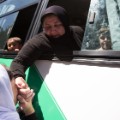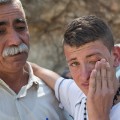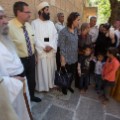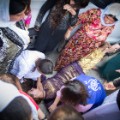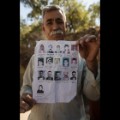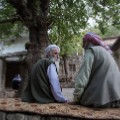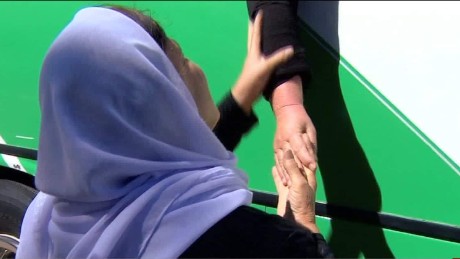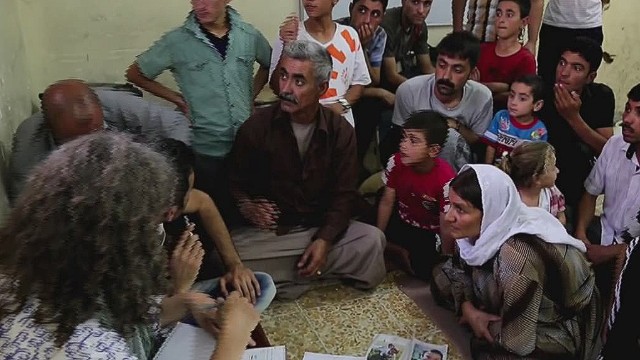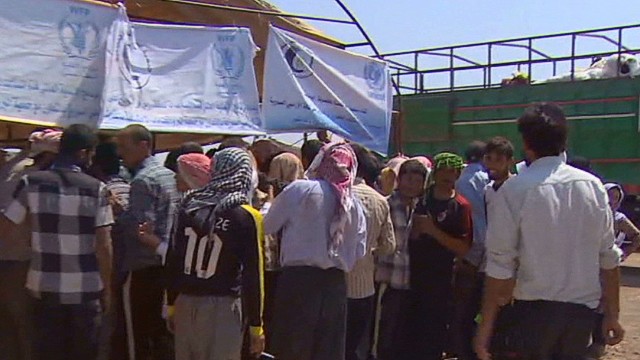Story highlights
- ISIS has succeeded in ethnically cleansing hundreds of thousands of Yazidis from their Iraqi homelands
- The Yazidis are an ancient religious group believed to pre-date both Christianity and Islam
- ISIS considers the group to be apostates and has killed and enslaved thousands
Lalish Temple, Iraqi Kurdistan (CNN)"Goodbye," a woman dressed in a black shawl murmured in Kurdish, as she kissed the outstretched hand of an elderly cleric.
"Pray for me," said the next woman in line, as she bowed her head and kissed the old priest's hand.
This was a farewell ceremony for 66 women and children who had all been former captives of the armed Islamist movement known as ISIS.┬Ā
Most of those gathered here suffered unspeakable crimes at the hands of the jihadi militants.┬Ā And all of the victims were Yazidis, members of an ancient ethnic and religious minority whose future in Iraq is now in question.
In the courtyard of the centuries-old Lalish Temple, next to an archway decorated with stone carvings of the sun, the moon, and a yard-long black snake, Baba Sheikh -- the spiritual leader of the Yazidis -- leaned on a cane as he gave a final blessing to the congregation.┬Ā
The women shrouded in the black color of mourning and their children would soon travel to Germany, where they were being offered refuge, psychological support and an escape from the horrors of war in Iraq.┬Ā
"What ISIS did to you, will not happen again," said the Yazidi patriarch, who was dressed in flowing white robes and wore a long white beard.
"Stop wearing black," he urged the gathered women. "The black clothes will only remind us of the destruction of our villages and all the bad things that happened to us."
Historic persecution┬Ā
Modern-day Iraq is the traditional homeland of the Yazidis, an ancient religious group believed to pre-date both Christianity and Islam.┬ĀThe faith's roughly 600,000 members are taught that for centuries, they have been persecuted by the majority Muslim population that surrounds them.
Yazidi leaders often say their community suffered 73 massacres and genocides.┬Ā
On several occasions, Muslim conquerors overran the Lalish Temple, the holiest site in the Yazidi faith, turning it temporarily into a Muslim school.┬Ā
More recently, a series of horrific suicide truck bombings targeted a group of Yazidi villages in Iraq's nearby Sinjar province, killing more than 300 people in 2008.
But few could have predicted the ferocity of the assault launched by ISIS against the Yazidis in Sinjar in August of 2014.
The militants' lightning-fast conquest of the province triggered an exodus, as hundreds of thousands of people fled their homes.┬Ā Yazidi groups and the Kurdistan Regional Government have documented the deaths of at least 3,000 Yazidi civilians at the hands of ISIS, as well as the kidnapping of more than 5,000 Yazidis -- most of whom were women.
Modern-day slavery┬Ā
ISIS considers Christians and Jews to be "people of the book:" religions recognized and respected in the Koran.┬Ā But the movement detests the Yazidis, who are considered to be apostates.┬Ā In fact, ISIS proudly revived a detested practice as punishment for the Yazidis, imposing a modern-day version of slavery on its Yazidi prisoners.
Several former female captives have described to CNN how they were bought and sold as human property over the last year.┬Ā
"ISIS found some verses in the Koran to justify modern day slavery," explained Mamo Othman, a Yazidi and former minister of the Iraqi Government, who now teaches at the University of Duhok in Iraqi Kurdistan.
"ISIS has taken us back 1,400 years," Othman said.
"We are all traumatized now," said Myrza Dinnayi, a Yazidi advisor to the Kurdistan Regional Government.┬Ā Dinnayi said he had interviewed more than a thousand Yazidi women who escaped after being held by ISIS. Nearly all of them had been subjected to repeated sexual assault. Many of them, they were sex slaves under ISIS captivity.
"They were beaten, tortured by ISIS fighters.┬Ā They were in ISIS prisons for months.┬ĀSo they have PTSD [post-traumatic stress disorder], hard depression.┬ĀAnd we have no instruments here in Iraq to treat them."
Long process of healing┬Ā
Dinnayi and his charity AirBridge Iraq have been working with the government of the German state of Baden-Wurttemberg to relocate hundreds of female and child victims of ISIS to Germany.┬Ā There, they receive two-year residency permits, psychological treatment, and government support for housing and school for children.
Dinnayi conceded that this will only be the beginning of a long process of healing for people who may never truly recover from the atrocities they endured.
"It is not a normal surgical operation," said Dinnayi, who also happens to be a medical doctor. "I know they are injured... our duty is to help these victims to live better with their injuries."
Dinnayi said it was important for the Yazidi leadership to send a message to the victims that despite the sexual attacks they endured in slavery, they were still welcome and cherished members of the Yazidi community.
Final pilgrimage
Before the journey to Germany, each group of women and children made a final pilgrimage to the Lalish Temple.
Nestled in a valley in the Iraq's semi-autonomous Kurdistan region, the temple complex features a series of shrines and grottos capped with pointed pyramid towers.┬Ā There is a timeless quality to this peaceful sanctuary.┬Ā
At sunset, Yazidi elders with flowing mustaches and turbans watched as a young volunteer scurried barefoot from one shrine to another, lighting candles, murmuring prayers for the victims of the massacres, and kissing the stones of the temple.
After receiving their blessing from Baba Sheikh, the congregation of 66 women and children emerged from the temple and walked down the hill to waiting buses. They were all barefoot, as is the custom for all visitors to this sacred ground.
Among those departing was 15-year-old Sabah Mirza Mahmoud, who would be traveling with his mother, younger brother, and 16-year-old sister.┬Ā ISIS took Mahmoud's sister hostage for three months, before she was finally released.
"Her situation was horrible," Mahmoud recalled.┬Ā"She was taken to Syria. She came back to us.┬ĀBut I still have 12 female cousins held by ISIS."
In fact, more than a year after the ISIS attack, Yazidi activists say there are still more than 3,000 Yazidi women being held in ISIS captivity.
Emotional farewell┬Ā
Tears streamed down young Mahmoud's face as he approached the bus that would take him to the airport.┬ĀHe and his family would get a chance at a new life in Germany.┬Ā But that did not make leaving home any easier.
"I'm happy and sad at the same time," the boy said of the upcoming journey.┬Ā
He then began to list the additional crimes ISIS had inflicted on his family. "They killed my dad.┬ĀThey killed my cousins and my uncles.┬ĀThey kidnapped 25 of my relatives, including women," Mahmoud said.
Mahmoud's uncle, Jamil Jato, unfolded a piece of paper with photos of more than a dozen family members murdered by ISIS. ┬ĀThey included Mahmoud's father, who Jato said was shot dead in front of his teenage son.
Mahmoud himself barely escaped death.
"They put him flat on the ground to kill him," Jato said.┬Ā"He was with eight or nine other children.┬Ā They lay them flat on the ground and asked them if they knew how to fire a gun.┬Ā They said 'no,' so ISIS let them go."
Mahmoud and his younger brother wept next to the bus as they hugged their gray-haired uncle goodbye. "Go ahead, get on the bus," Jato whispered, struggling to hold back his own tears.
Nearby, a little girl wailed and screamed, refusing to climb the steps with her mother onto the vehicle.
Aid workers with the International Organization for Migration, which was helping facilitate the trip to Germany, wiped tears from their eyes as they seated weeping travelers on the bus.
When the bus finally left, one of the young cousins tearfully waving goodbye collapsed unconscious on the pavement, overwhelmed by the emotion of the moment.
This is the agony of the Yazidis.┬Ā┬Ā
Ethnic cleansing
Since 2014, ISIS has succeeded in ethnically cleansing hundreds of thousands of Yazidis from their homelands.┬Ā
Many of the survivors have taken shelter in sprawling refugee camps in Iraqi Kurdistan.┬Ā They do so with the knowledge that thousands of their female relatives still languish in modern day slavery.
Those who can are leaving the country.
"We don't have a future in Iraq," said Jato, after watching his traumatized nephews and niece begin the long journey to Germany.








